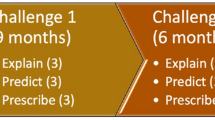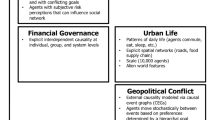Abstract
ACCESS—the Agent-based Causal simulator with Cognitive, Environmental, and Social System factors—is an agent-based simulation of an alternate world that is designed to test social science methodologies’ abilities to explain, predict, and prescribe policies for complex social systems. The ACCESS world model includes behaviors based on behavioral and cognitive sciences within and across individuals, groups, and the society to create a multi-level model that exhibits emergent phenomena. In this paper, we detail the logic underlying our conceptualization of the entities (individuals, groups, and the world) and their interactions. We also provide details on how we used the ACCESS model to challenge and score social scientist teams’ abilities to explain, predict, and prescribe in the artificial world as part of the DARPA Ground Truth program.





Similar content being viewed by others
Notes
The original plan for this feature was to add complexity to the world by modifying it to be a payout received only by low wealth agents and have the amount change based on a separate set of policies that all agents would vote on. The model was deemed to be sufficiently complex before this feature was implemented, though, so while the fixed income remained, it represents a rather innocuous action in the world.
References
Ajzen I, Fishbein M et al (2007) Theory of reasoned action-theory of planned behavior. Univ South Florida 67–98:1988
Bakan D (1966) The duality of human existence: an essay on psychology and religion. Rand McNally
Brewer MB (1991) The social self: on being the same and different at the same time. Personal Soc Psychol Bull 17(5):475–482
Brickman Philip, Coates Dan, Janoff-Bulman Ronnie (1978) Lottery winners and accident victims: is happiness relative? J Personal Soc Psychol 36(8):917
Diener ED, Lucas RE, Scollon CN (2009) Beyond the hedonic treadmill: Revising the adaptation theory of well-being. In: The science of well-being, pp 103–118. Springer
Dunbar R, Dunbar RM (1998) Grooming, gossip, and the evolution of language. Harvard University Press, Cambridge
Feldman JM, Lynch JG (1988) Self-generated validity and other effects of measurement on belief, attitude, intention, and behavior. J Appl Psychol 73(3):421
Festinger L (1954) A theory of social comparison processes. Hum Relat 7(2):117–140
Fishbein M, Ajzen I et al (1975) Intention and behavior. An Introd Theory Res 50:179–221
McCabe TJ (1976) A complexity measure. IEEE Trans softw Eng 4:308–320
North MJ, Collier NT, Ozik J, Tatara ER, Macal CM, Bragen M, Sydelko P (2013) Complex adaptive systems modeling with Repast Simphony. Complex Adapt Syst Model 1(1):3
Paulhus DL, Trapnell PD (2008) Self-presentation of personality: an agency-communion framework
Wood Joanne V (1989) Theory and research concerning social comparisons of personal attributes. Psychol Bull 106(2):231
Acknowledgements
This document does not contain technology or technical data controlled under either the U.S. International Traffic in Arms Regulations or the U.S. Export Administration Regulations. This material is based upon work supported by the Defense Advanced Research Projects Agency (DARPA) under Contract No. HR001118C0022. Any opinions, findings and conclusions or recommendations expressed in this material are those of the author(s) and do not necessarily reflect the views of the DARPA.
Author information
Authors and Affiliations
Corresponding author
Additional information
Publisher's Note
Springer Nature remains neutral with regard to jurisdictional claims in published maps and institutional affiliations.
Rights and permissions
About this article
Cite this article
Rager, S., Leung, A., Pinegar, S. et al. Groups, governance, and greed: the ACCESS world model. Comput Math Organ Theory 29, 52–83 (2023). https://doi.org/10.1007/s10588-021-09352-x
Published:
Issue Date:
DOI: https://doi.org/10.1007/s10588-021-09352-x




